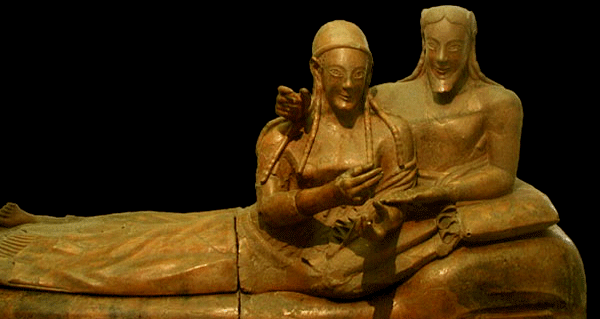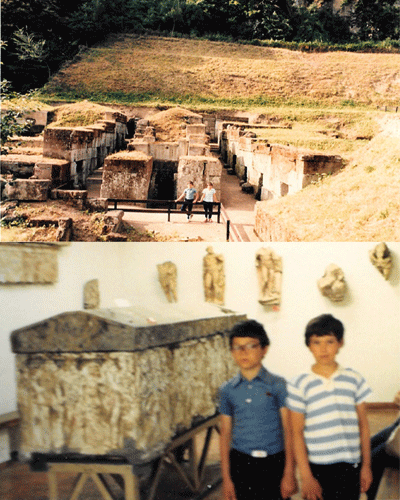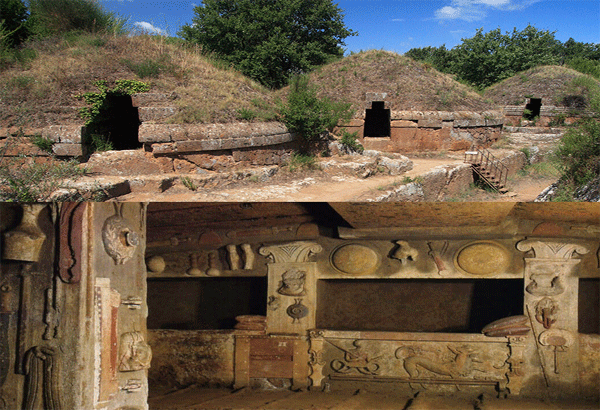VISITA ANCHE TUTTE LE ALTRE PAGINE DI ......
The Mysterious Civilization of the Etruscans
I RESTI DELLE NECROPOLI ETRUSCHE
The Etruscans were a mysterious people who can now only be known through their necropolises or museum exhibits. Although closer in time, they are less accessible than the people of ancient Egypt, Mesopotamia, Crete, or Mycenae. Moreover, Etruria never produced an "Homer"—in other words, the Etruscans lacked glorious legends passed down by bards over many centuries.
The 700-year history of the Etruscans exists only in summaries written by their enemies—the Greeks and the Romans—who ultimately survived them and wrote about them with bias. The Etruscans arrived during an era of great nomadic movements that marked the end of the Bronze Age. At that time, in what is now Italy, nameless tribes and clans moved like shadows across the land, leaving behind almost no traces.
Likely around the 8th century BCE, the Etruscans arrived in Italy by sea. On the western coast, above the Tiber River, they built strong rock fortresses, similar to the old Mycenaean style. Having discovered iron deposits, they developed a metal industry and forged swords and spears superior to those of any other people of their time.
Their military superiority allowed them to advance inland, gradually subjugating the tribes between the Tiber and the Alps. They launched fleets, boldly sailed the seas, mixing trade with piracy. In doing so, they often clashed with the Greeks or the Carthaginians, against whom they fought fiercely and successfully.
The use of iron in their ships' prows made them ideal for ramming enemy vessels. The Etruscans called themselves “Rasena,” but the Latin name “Etrusci” meant "pirates." They were, by far, the most advanced people of the Italian peninsula.
At that time, much of Italy's territory was covered in forests and malaria-ridden plains. Etruscan engineers built tunnels through the hills, allowing excess lake water to drain away. They also constructed roads, as well-built as those the Romans would later build centuries afterward. These roads were well-drained and designed to carry heavy traffic through forests and rocky areas.
Soon, Etruscan cities rose in reclaimed lands—not just clusters of huts, but fully walled communities, with two main intersecting roads.
We must acknowledge that the Romans would later imitate this urban layout both in their military camps and their cities. By 600 BCE, Etruscan civilization was flourishing. Several Etruscan cities minted their own coins, demonstrating their economic independence. However, there was never a unified empire, only a loose federation of city-states, each ruled by its own feudal lord.
This leader held both military and religious authority, serving as both general and priest. Etruscan warfare was relatively limited, as Greece and Carthage often preferred negotiations and diplomacy over direct conflict. The Etruscan federation never embarked on an organized, large-scale war.
One of the most intriguing mysteries surrounding the Etruscans is their origin. Greek historian Herodotus, writing in the 5th century BCE when the Etruscans dominated Italy, claimed they once lived in Lydia (modern-day southwestern Turkey) but abandoned it due to a long famine.
However, Dionysius of Halicarnassus, a Greek historian from that same region four centuries later, strongly rejected Herodotus’s claim. Dionysius argued that the Etruscans were indigenous Italic tribes that had merged over time, but had always lived in Italy.
During Dionysius’s lifetime, few people still spoke Etruscan, yet sacred texts and traditional stories of the people were still preserved. He pointed out that the Etruscans had never spoken Lydian nor worshipped Lydian deities.
Lydia was the most powerful of several nations between the Hellespont and Syria. Its capital, Sardis, was renowned for its wealth and grandeur, as its ruins still testify today.
Historians who support the Lydian origin theory highlight linguistic evidence: The Etruscan name "Rasena" reportedly existed in various forms in prehistoric Turkey.
Regardless of their origins, the Etruscans were highly civilized when they appeared along the Italian coast. In any case, they ruled Rome for its first 100 years and left a significant mark on Roman traditions. Without their influence, early Roman civilization would be difficult to understand.
Yet, Roman literature remained almost silent about them. We must also acknowledge that the Etruscans transformed Rome into a true city. Although legend attributes the name Roma to Romulus, some scholars argue that the term is actually of Etruscan origin.
It is also important to highlight that the Etruscan tombs found beneath the Roman Forum have proven to be extremely ancient. In any case, there is no doubt that the Etruscans dominated Rome for a certain period.
Etruscan engineers built the walls and sewers of Rome, transforming it from swamps into a protected city. They probably built the first wooden, brick, and stone buildings. But the Etruscans never considered Rome as their capital since they did not have a capital.
Their oldest and most powerful city was Cortona, said to have been founded before Troy. Their funerary art implied that they lived in luxury and enjoyed life. At home and in society, they reserved the place of honor for women.
Moreover, the Etruscans were extremely knowledgeable. The great encyclopedist Marcus Terentius Varro declared that he had used Etruscan texts in compiling his 490 books, which covered every field of science and art.
Of all European peoples, the Etruscans were the most devoted to religious rites, probably believing that their ceremonies could yield good results both in this world and the next. They considered themselves blessed by their ancient nature gods, who promised them eternal life in a pleasant afterlife.
For the Etruscans, death was the beginning of a journey and only a temporary separation from loved ones. No other people cherished their dead as much as the Etruscans. No other people provided such pleasant environments for them.
Priests taught that if a spirit was dissatisfied, it would leave its tomb to torment the living. Thus, mausoleums were equipped with everything they might desire.
Unlike the Greeks, the Etruscans became obsessed with religion. They never made the transition from superstition to scientific inquiry. With absolute submission, the Etruscans always obeyed their sacred texts and priests.
Etruscan priests studied omens with great dedication, seeking ways to appease the gods and read the future.
Even the Romans, not only the Etruscans, were certain that Etruscan priests called haruspices were highly skilled in the art of divination, that is, predicting the future.
When a haruspex saw that catastrophe was imminent, he would suggest ways to avoid it or mitigate its effects, while admitting that he could not be certain of the success of his advice.
For the Etruscans, the workings of the gods were like the tides and seasons. Nothing happened by chance. The future was preordained, and therefore, men had to adapt as best they could.
The haruspices influenced human minds and behavior for centuries. They had long predicted to the Etruscans that their nation would last ten chapters, each lasting roughly a century, before ultimately disappearing.Prof. Giovanni Pellegrino
SECONDA PARTE DEGLI ETRUSCHI >>>>>>>>>>>>>>
1) LA GRANDE CIVILTA' DEGLI ETRUSCHI
2) LA SOCIETA' - IL SAPERE DEGLI ETRUSCHI



